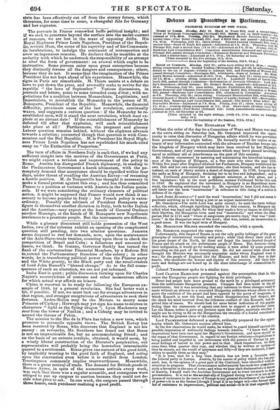The portents in France somewhat baffle political insight ; and
if we seek to penetrate beyond the surface into the under-current of rumours, we are lost in the maze of opposing drifts. His Royal Highness Prince Louis Napoleon, President of the Repub- lic, revisits Ham, the scene of his captivity and of his Communis- tic lucubrations, to indulge the sentiment of retrospection and avow an ingenuous remorse. He declares that he trembles at the audacity with which he undertook the responsibility of an attempt to alter the form of government: an avowal which ought to be instructive. Some persona enter upon great enterprises because they distinctly foresee all the dangers and consequences; others, because they do not. It seems that the imagination of the Prince President has not kept ahead of his experience. Meanwhile, the signs in Paris are remarkable. M. Thiers assists at a debate on laws to put down the press, and avowedly seeks to revive for the republic " the laws of September." Various discussions, in journals and letters, point to some intended coup d'etat ; with ne- gotiations for a coalition between Monarchists, Legitimists, and Imperialists, to reestablish the Monarchy in the person of M. Bonaparte, President of the Republic. Meanwhile, the financial difficulty, proximate cause of the last revolution, continually waxes, and suggests a curious question : if the Monarchy be re- established soon, will it stand the next revolution, which must ex- plode at no distant date? If the reestablishment of Monarchy be deferred till after that explosion, will such reestablishment take place at all ? Furthermore, the pregnant and gloomy Labour question remains behind, without the slightest advance towards a solution - connected though that question is with Com- munism and the Red Republic. M.le President his Royal High- ness Prince Louis Napoleon has not republished his much-cited essay on "the Extinction of Pauperism."


























 Previous page
Previous page